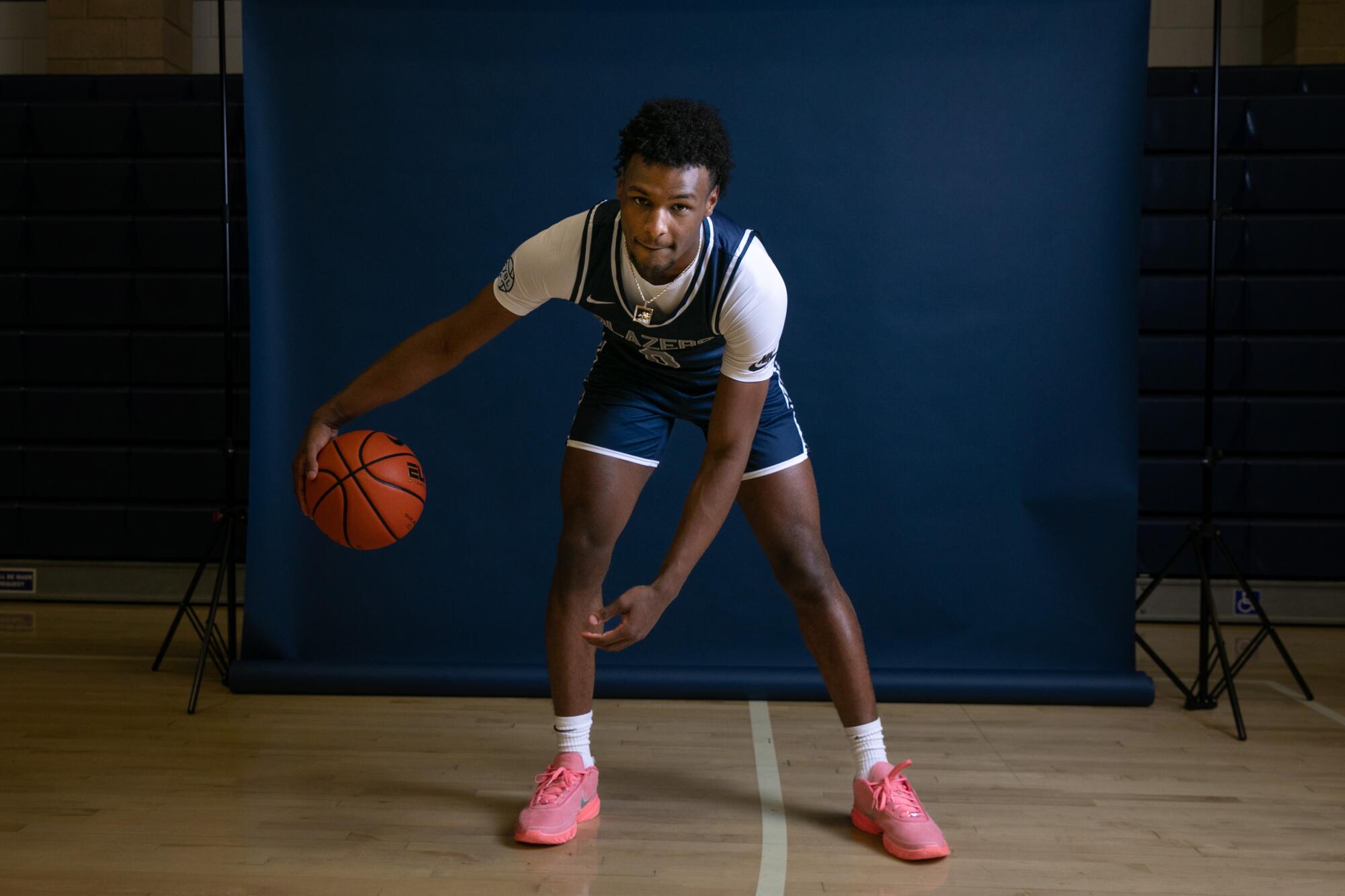
He bounded out of the tunnel at Nationwide Arena in Columbus, Ohio, with his trademark poker face, running past older fans who watched his father dominate in local gyms and teens in puffy coats calling his name.
âBronny!â âBronny!â
Bronny James threw down a windmill in warmups that drew an âooooohâ from thousands gathered at Nationwide in mid-December. The narrative was simple: Bronny and Chatsworth Sierra Canyon High taking on LeBron Jamesâ alma mater, St. Vincent-St. Mary, for the third time in four years.
But this was the first time that Sierra Canyon really was Bronnyâs team.
âIâm hoping to see a good show from Bronny ⌠see Bronny really take it to the next level,â said former NBA player Clint Smith, sitting in the stands.
He did not. Bronny scored seven points, fouled out with a few minutes to play and was relegated to the bench during a 67-61 loss.
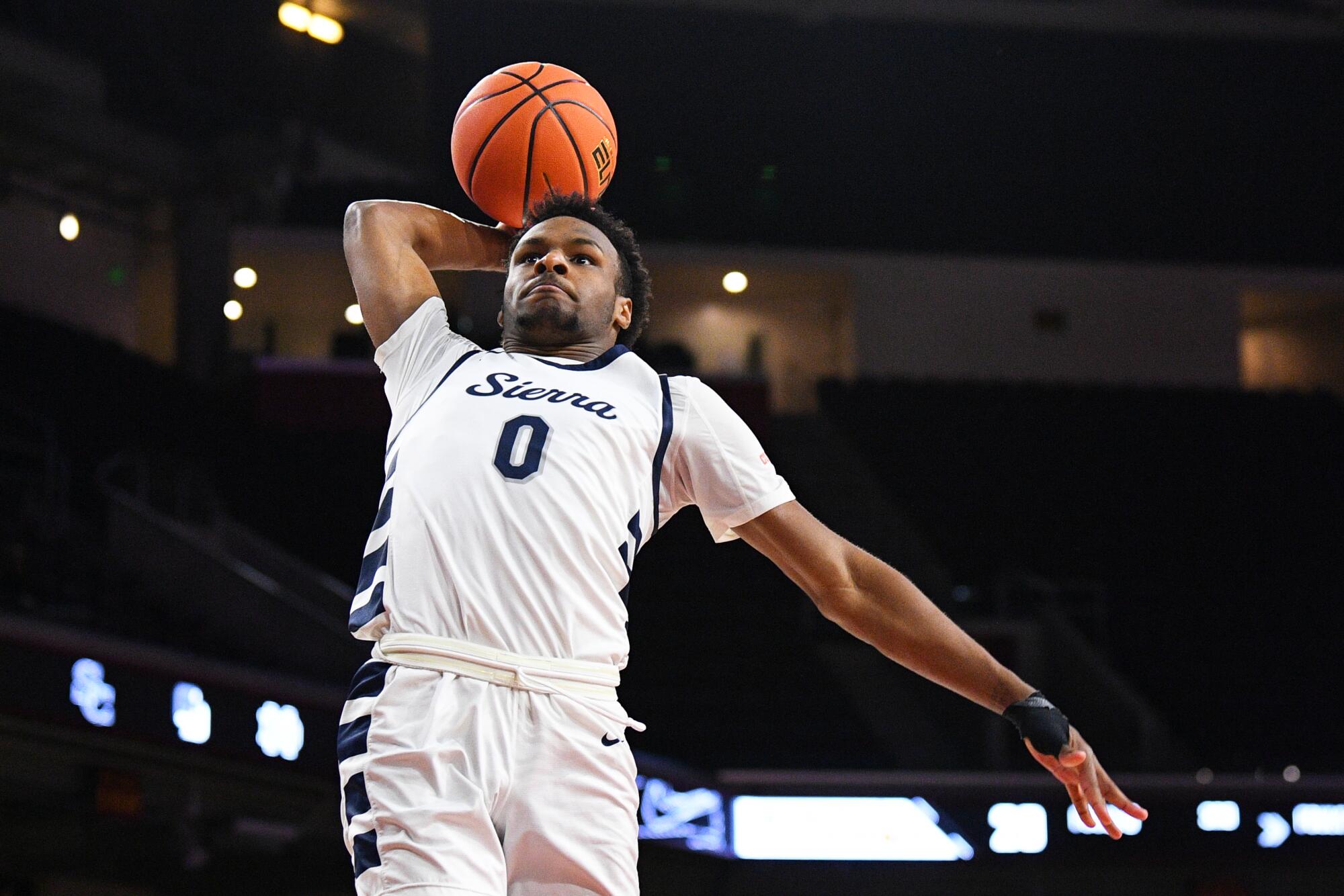
That poker face, assistant coach Chris Madden said, generally remained intact through four years of impossible expectations as the most visible high school athlete in America. Pull on the headphones, block out the noise. Seeing, reading, but not reacting.
Yet a half-hour after that loss in December, in the hallway, Bronny slumped in a chair next to brother Bryce, headphones on, burying his head between his legs.
His mother, Savannah, approached. She gently patted his head.
It was a low point during a tumultuous senior season of growth, injury and disappointment for Bronny, an athlete trying to forge his own path thatâs constantly altered by outside expectations. From media. From fans. From his father.
The Times traveled 6,000 miles and attended 21 games during Bronnyâs senior season. After months of observations and 70 interviews inside Sierra Canyon and outside the program, two truths became clear.
Bronny James is great, in his own way. And for many, that will never be enough.
Ever since his AAU highlights went viral at 10 years old, Bronny has grown up in front of millions.
A slice of his journey is captured on Instagram reels, TikToks and YouTube channels, amplifying the hype around his name while also distorting reality. His highlights draw praise and admiration, but they also fuel cynicism. Critics question: Is he truly good enough to justify the attention?
So the chirping follows Bronny at every turn. When Instagram aggregator LegionHoops posted he made the Nike Hoop Summit roster, some of the top comments read: âLast name privilegesâ and âNepotism merchant.â
Bronny later was chosen for the McDonaldâs All-American game, which will be played tonight in Houston, and was outplayed during subsequent games by Sherman Oaks Notre Dame senior Caleb Foster, who wasnât selected for the game.
âThere is kind of a smell of nepotism here that isnât good for our kids,â Dinos Trigonis, a West Coast NCAA recruiting analyst, said of Bronnyâs All-America selection.
Thereâs that word again. Nepotism. Yet LeBron, his former St. Vincent-St. Mary coach Dru Joyce said, recognizes his sonâs journey is different from his own and tries to protect Bronny from scrutiny. Bodyguards attend every game, sometimes trailing his window-tinted black Mustang after school. Bronny answered questions from the media once during four years at Sierra Canyon, making a few brief comments after a junior-year game at what was then called Staples Center.
âIt felt special,â he said of playing in the same arena as his dad.
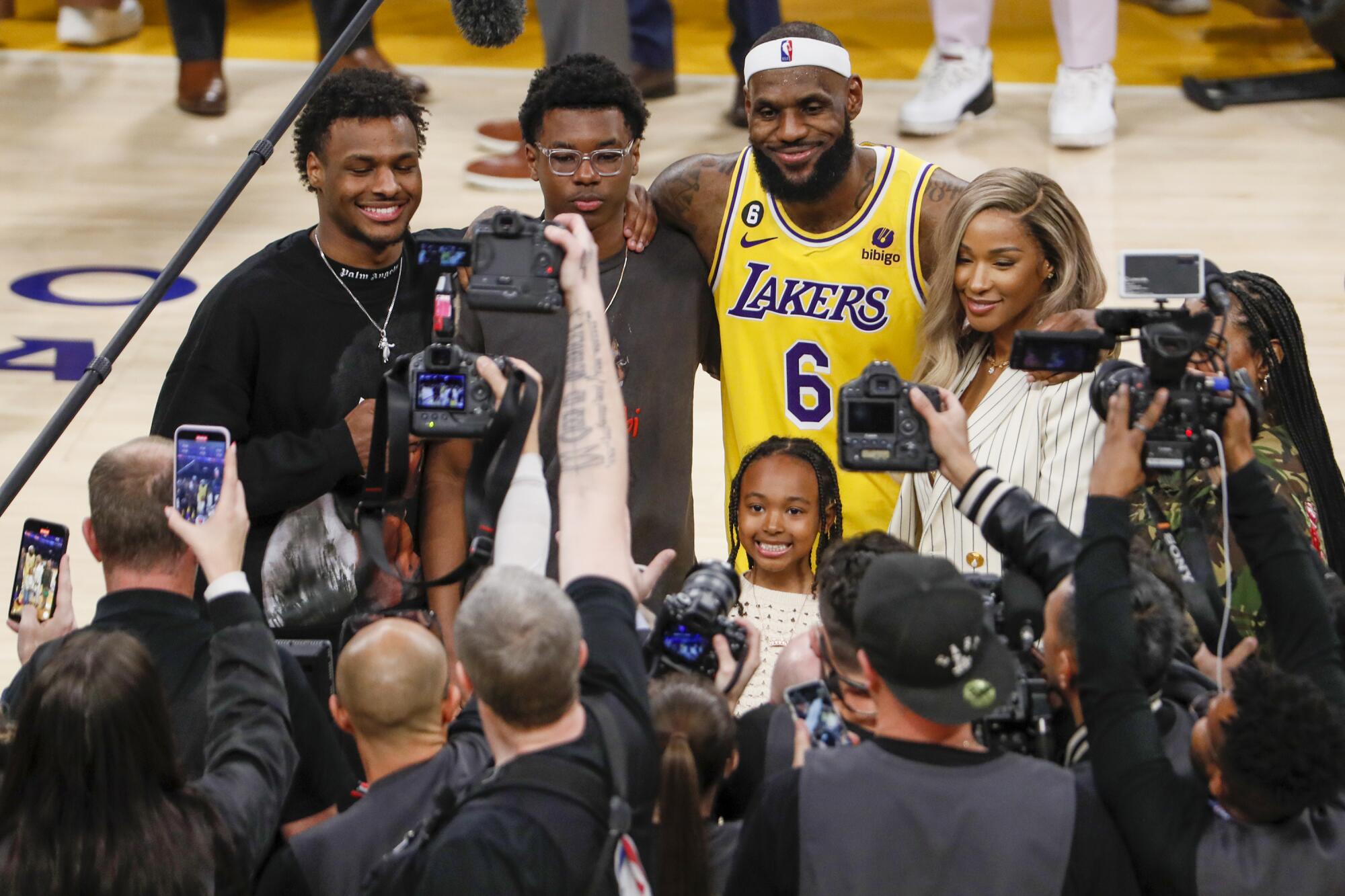
Inside the Chatsworth bubble, life is simpler. Bronny patiently poses for pictures with anyone who asks. He takes over the speaker in warmups to play Yeat. He is cheerful but generally quiet in public â eerily similar to his fatherâs â never loud.
âWhen youâve got these four- or five-star kids, [sometimes] theyâve got the entourage, the stardom, and theyâre not quality people in general,â said coach Larry Thompson of Wheeler High in Marietta, Ga., which lost to Sierra Canyon at the Galen Center in January. âTheyâre entitled, spoiled, whatever the case may be.
â[Bronny] is the complete opposite.â
He might not demand attention, but Bronnyâs online presence is vast. He is one of the most famous teenagers in the world, with 7 million Instagram followers and endorsement deals galore. Outside of commercial appearances and the occasional social media flash, his personality is tightly guarded. Itâs often left LeBron to be the sole voice representing his son.
Sometimes, the proud fatherâs proclamations invite more scrutiny.
On March 6, LeBron tweeted âMan Bronny definitely better than some of these cats Iâve been watching on [NBA] league pass today. S--- lightweight hilarious.â
The following night, Bronny scored 10 points as Sierra Canyon was bounced out of the state tournament by Notre Dame.
âHe has to live up to a standard that most â well, none of us â could ever live up to,â Joyce said of Bronny. âLetâs be real. You canât be LeBron James.
âHeâs LeBron James Jr., and thatâs important. Thatâs important for him, because that allows him to understand who he is.â
Heâs had to figure that out inside a program where, as assistant coach Chris Howe put it, the pressure and level of expectation is âridiculous.â
In his phone, Sierra Canyon co-founder Howard Wang keeps a list of more than 100 Hollywood A-listers whoâve sent their kids through his campus. Will Smith. Jamie Foxx. Stevie Wonder. And the highest-profile corner of the institution is the basketball team, which has fielded sons of NBA legends also on Wangâs list: Dwyane Wade, Scottie Pippen, Penny Hardaway.
Recruits at Sierra Canyon are four- and five-star prospects, transferring in and out annually. Playing time is precious. And glimmers of Bronnyâs promise â 15 points and the game-winning layup against St. Vincent-St. Mary as a freshman â were dimmed by injury and competition within the Sierra Canyon program.
As a sophomore, in the midst of COVID-19, he tore his meniscus. As a junior, he made strides, but was slowed by knee injuries. And even as he brought a new wave of celebrity to Sierra Canyon, Bronny took supporting roles behind players such as now-UCLA freshman Amari Bailey and Memphis Grizzlies forward Ziaire Williams.
âBronny has been through a lot over the years,â Sierra Canyon junior Isaiah Elohim said in November. âI think this is his year to really break out.â
The baton was his at the start of his senior season, one of just two four-year players on the Trailblazersâ roster after a fresh wave of transfers. The stakes rose in August, when LeBron first told Sports Illustrated his now-well-documented goal to play with Bronny in the NBA.
During a preseason tournament in Las Vegas, fans inside Bishop Gorman Highâs gym marveled at a dizzying sequence of late-game pull-up threes from Bronny. His jumper was polished, he was now a well-built senior unleashing rim-rattling dunks.
âDonât talk to me,â he said to one trash-talking opponent, en route to 31 points.
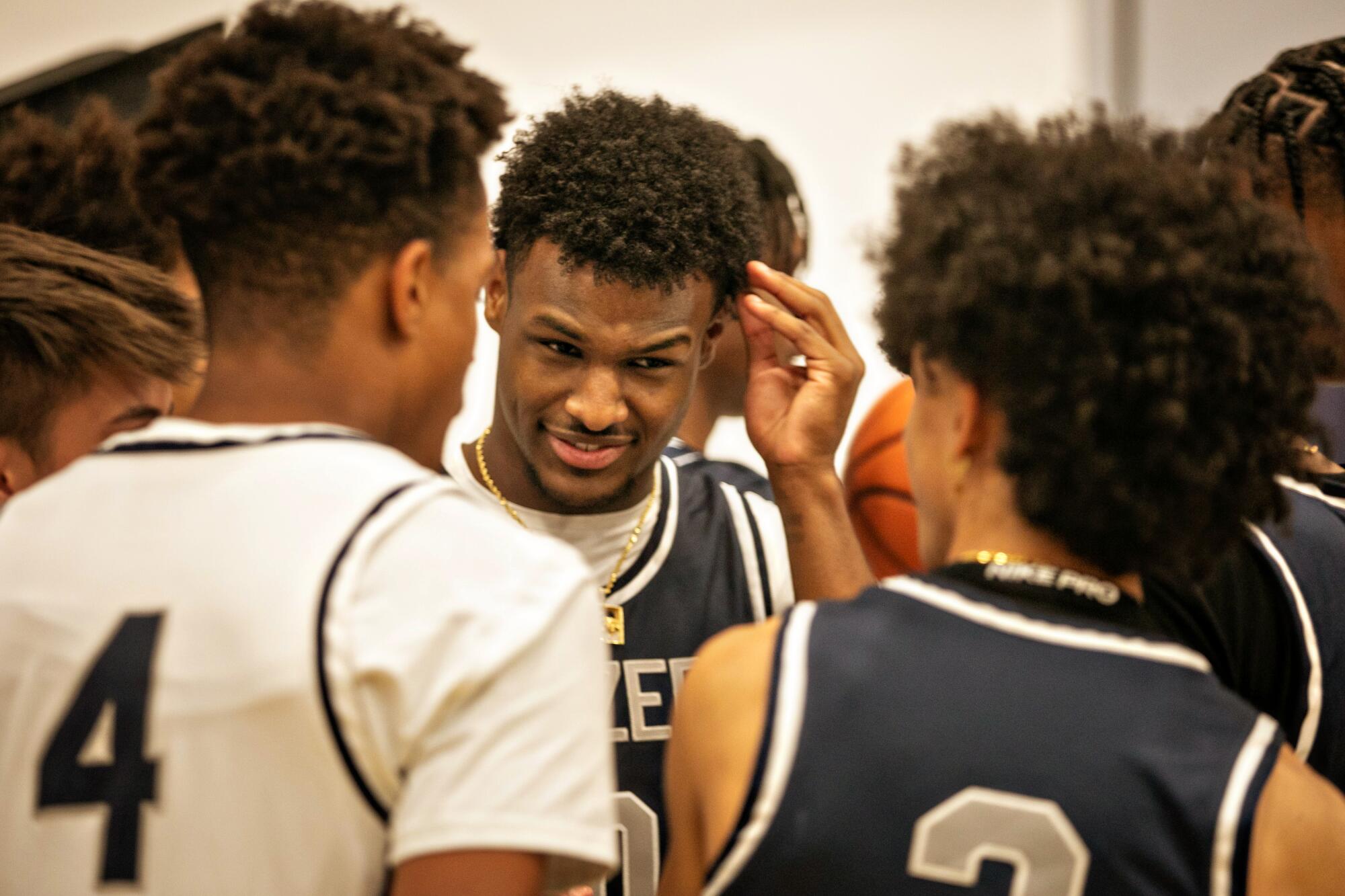
Confidence can be fickle when youâre the son of a great. Missteps in the public eye take a toll, said Crossroadsâ Nils Cooper, son of Lakers legend Michael Cooper.
âYou start to question yourself,â Nils said. âLike, âAm I even good anymore?ââ
The Sierra Canyon seniorâs demeanor struck Nils when the two met during Bronnyâs second game of the season. During one shot attempt, Nils remembered, James yelled âBoom!â as soon as the ball left his fingertips.
He missed. It was a rare missed shot as he finished with 25 points.
âHaving to live with his name, heâs just really starting to not just be serious about basketball, but take it as serious as other people see him in that light,â said Clippers assistant Dahntay Jones, whose son has played AAU basketball with Bronny.
After scoring outbursts early in his senior season, highlights of NBA-range threes and transition dunks were supplanted by minutes-long stretches during which, somehow, it was easy to forget the son of the biggest star in the world was on the court.
During most of a regular season spent trying to find his place as a leader, Bronny had big games against weaker opponents (41 combined points during the first two days of the winter Les Schwab Invitational in Portland, Ore.) but fell silent against tougher teams (10 points during a loss to West Linn, an elite Oregon team.
âIt just seems like he turns it on and off,â Trigonis said. âHeâs not consistently dominant. Heâs talented, but heâs not consistently dominant.â
In his famous Hall of Fame speech in 2009, Michael Jordan turned his attention to his children for a moment, delivering a blunt message.
âI think that you guys have a heavy burden,â Jordan said. âI wouldnât want to be you guys if I had to, because of all the expectations that you have to deal with.â
Jordan would sit high in the stands when he watched sons Marcus and Jeffrey play. He was blocked from view and inaccessible.
LeBronâs approach has been radically different. If his Lakers didnât have a game, heâd almost always be courtside at Sierra Canyon, sharing a laugh with wife, Savannah.
Not a game went by without interaction with his son.
In the second quarter of a senior-night game against Loyola High in January, Bronny threw an outlet pass to streaking senior Ashton Hardaway in the open court. But the pass was inches too long, tipping off Hardawayâs fingers.
Bronny turned his head to his father. Subtly, LeBron pursed his lips and nodded at him in encouragement.
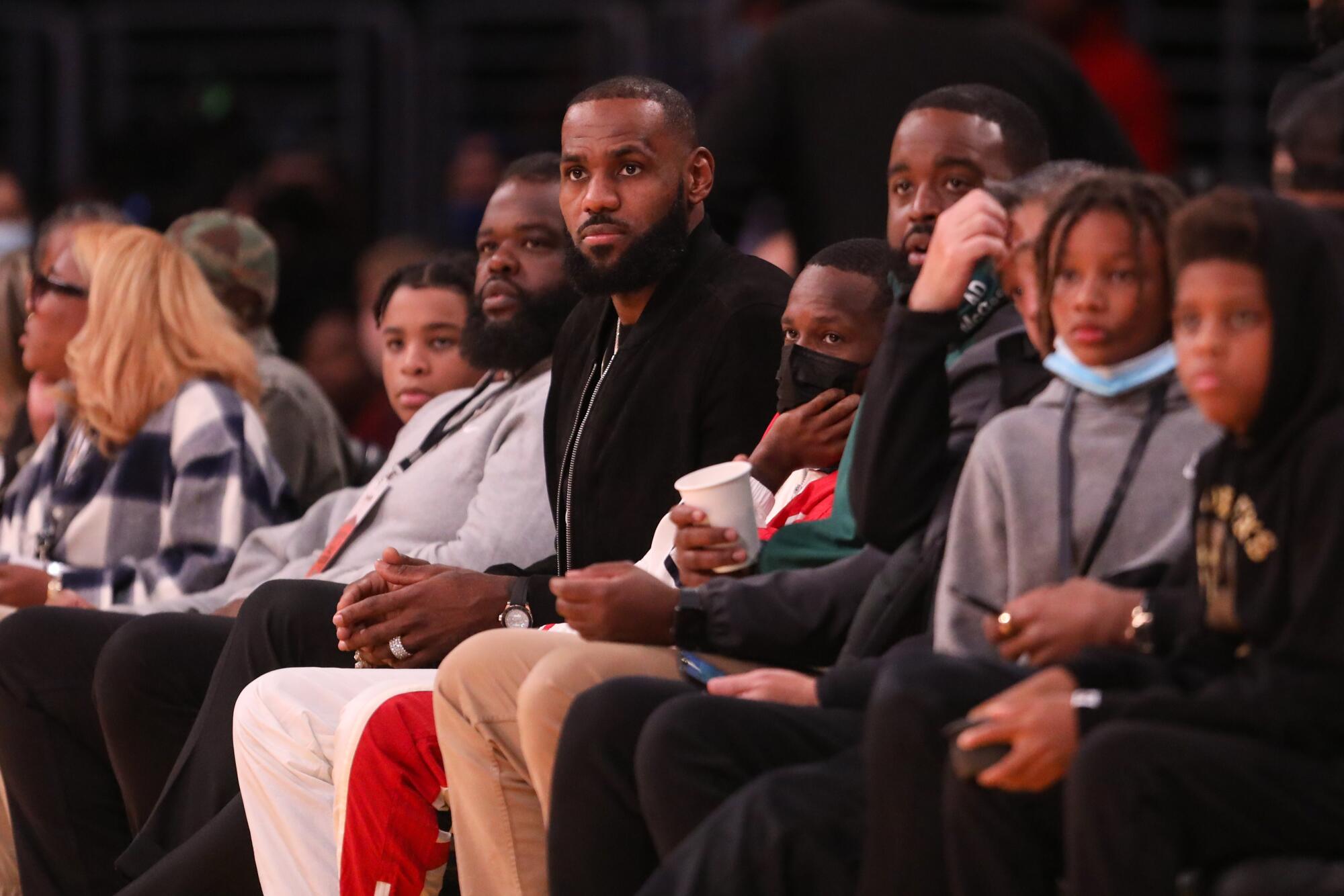
LeBron was a proud father, throughout his sonâs senior year. He gathered Bronny and his brother, Bryce, for a picture during halftime of an ESPN-televised game against New Yorkâs Christ the King on Dec. 12, posing with buddy Carmelo Anthony and his son Kiyan. LeBron grinned while watching Bronny receive a framed jersey and bouquet of flowers during Sierra Canyonâs senior night in January. And LeBron was often receptive to media questions about his sonâs journey.
âIf he wanted to, he could shoot 20 shots a game and average 30, but itâs not always about that,â LeBron said in late February. âItâs about how you can go out and play the right way and play for your team. And all he cares about is winning and playing with great basketball players.â
At his core, though, coaches inside and outside of Sierra Canyon said, Bronny is simply not a 30-point-per-game scorer. To them, he stands out in other ways.
Venice coach David Galley lauded Bronnyâs poise and refined footwork. Thompson noted Bronnyâs implicit understanding he should sprint to the corner in transition. And most everyone raves about his on-ball defense, perhaps Bronnyâs best skill.
âMany people think you got to light up the scoreboard every night to be a superstar,â Temecula Rancho Christian coach Ray Barefield said. âBut he has a lot of intangibles that go into winning.â
Bronnyâs best performances this season came when he guarded with commitment. When he attacked under control in transition. If he trusted himself, Trailblazers coach Andre Chevalier said, the sky was the limit, and it all came together during a 22-point performance that led Sierra Canyon to the win over Wheeler.
âI think heâs just starting to see who he is,â Chevalier said after that game, âand know who he is.â
The collapse started innocently enough, Bronny milling around in sweats during a game against La Canada St. Francis on Jan. 18. Sierra Canyon pulled out a 61-43 win behind Elohim, and Chevalier said postgame that Bronny was resting his knee after the previous yearâs troubles. No problem.
Then one missed game for Bronny turned into five before Elohim was knocked out for most of the season with an ankle sprain Jan. 27.
Their engines gone, Sierra Canyon went into a tailspin. When James returned Feb. 1, it was too late. The Trailblazers dropped four in a row through the end of the regular season into the Southern Section Open Division playoffs, unceremoniously bounced from pool play with an 0-3 record. Outside of a 19-point performance against Notre Dame during the final game of the regular season, Bronny underwhelmed.
For the first time in Chevalierâs six-year tenure, the Trailblazers were bumped to Division I for the state tournament. It seemed as if a roller-coaster career at Sierra Canyon would end with little pomp and circumstance.
âHeâs going to have to do everything for us,â Chevalier said entering the tournament. âHeâs going to have to be aggressive on the offensive and defensive end. Heâs going to have to lead ⌠he understands right now what his role is.â
Bronny was always a quiet, lead-by-example player, even in his senior year. But suddenly, from the start of the state tournament, he was the loudest player on the floor. Yelling defensive assignments while waiting to check in. Bellowing with gusto at clutch buckets by teammates.
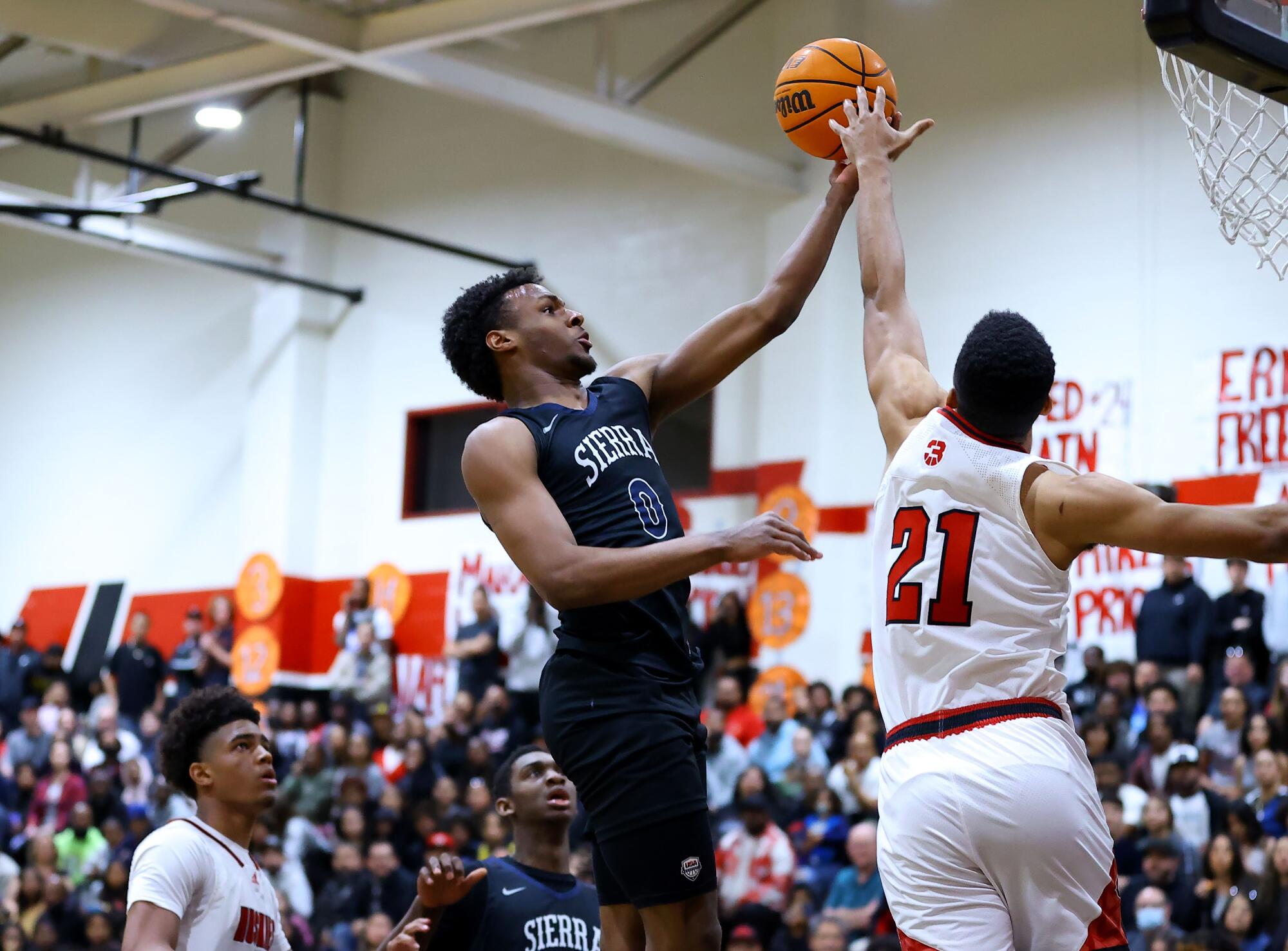
He scored 21 points against Etiwanda, Chevalier slapping his hand and encouraging him in the second quarter to keep pushing the pace. He scored 16 against Torrance Bishop Montgomery, burying a few momentum-changing shots.
And then he went dormant again, scoring just 10 points as Sierra Canyon was blown out by Notre Dame.
His high school career ended, he trudged off the court at Calabasas High. His next big decision will be committing to a college. Bronny announced in January that Ohio State, Oregon and USC are his finalists.
An hour after accepting his McDonaldâs All-American jersey at Sierra Canyon, Bronny bounded down the stairs to the gym carrying a Happy Meal box and a look of faux indignation.
Right after the ceremony, heâd stopped by McDonaldâs but theyâd made him pay, he said.
âYou didnât show your phone, thatâs why,â assistant coach Madden, in the middle of an interview, yelled to him.
âBut I had the jersey!â Bronny responded.
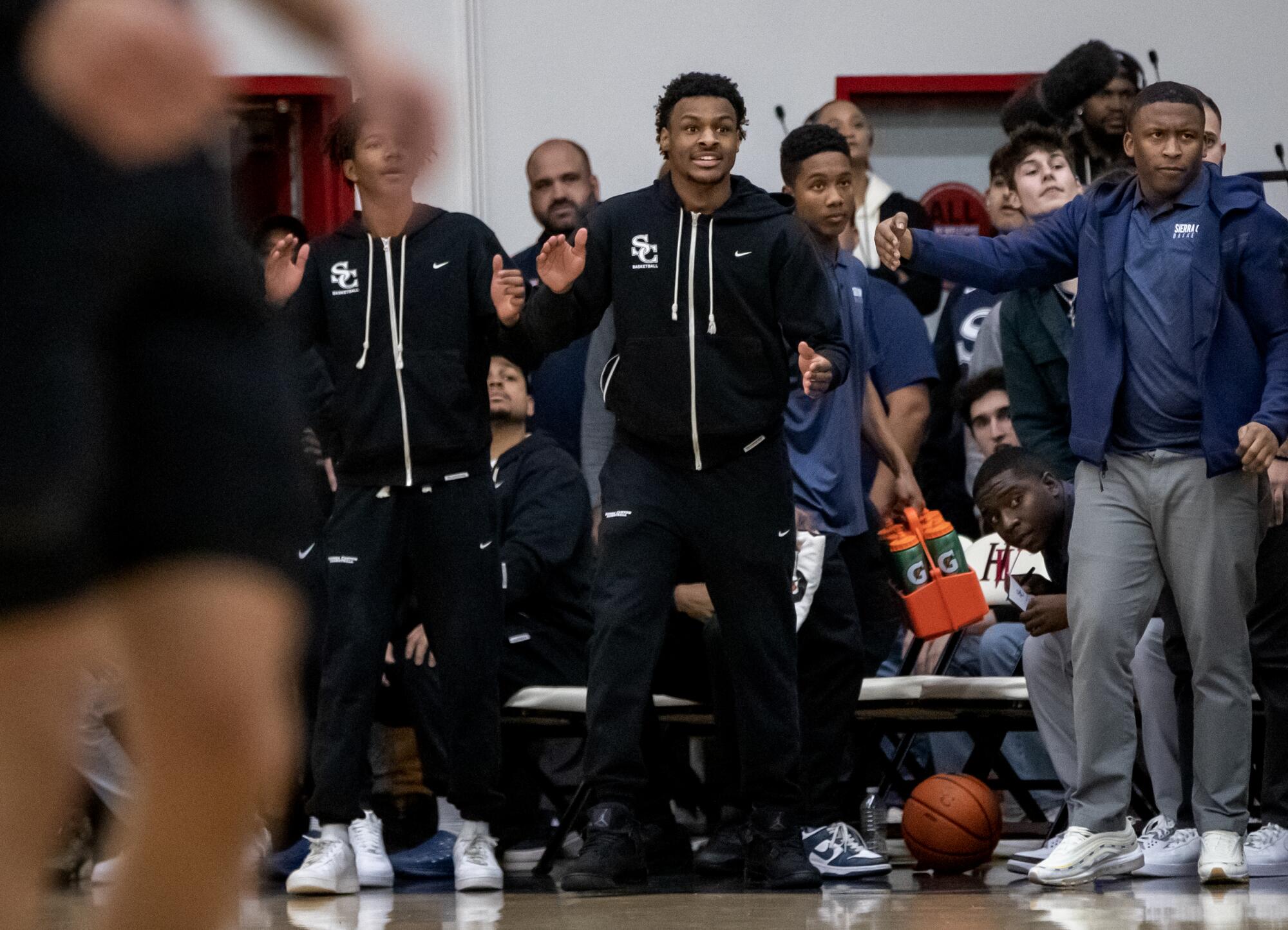
He finished his senior season averaging 14.1 points, 5.6 rebounds, 2.4 assists and 1.7 steals, numbers that seem disappointing on the surface. And the masses will expect even more of Bronny in college â every misstep scrutinized, every quiet performance torn to shreds. All under the context that the clock is ticking on his fatherâs time in the NBA and hopes to play with his Bronny.
âHeâs had that bullâs-eye on him before,â Madden said. âNow, with obviously his dad saying those things, it multiplies times 10.â
But this is a kid whoâs seen it all, whoâs heard it all, who absorbs it and continues to work under the weight of the expectations of millions.
âI think heâs ready,â Madden said.
Perhaps the best story of Sierra Canyonâs season came from the bench, where 12-year-old team manager Erik Ginsburg was waiting, briefly going viral in January after cleaning wet spots during mid-game pauses with hilarious ferocity. And Ginsburg grinned brightly when asked about Bronny, someone the manager calls a friend.
âHe respects everyone,â Ginsburg said.
It can be hard to see, because the name is so giant. But Bronny Jamesâ greatness comes in the little things.
More to Read
Get our high school sports newsletter
Prep Rally is devoted to the SoCal high school sports experience, bringing you scores, stories and a behind-the-scenes look at what makes prep sports so popular.
You may occasionally receive promotional content from the Los Angeles Times.







